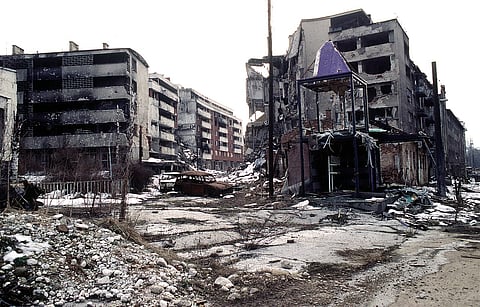

Bosnia’s Constitutional Court has temporarily suspended legislation passed by the autonomous Republika Srpska (RS) region that rejects the authority of federal police and judiciary within its territory. The laws, introduced by Bosnian Serb leader Milorad Dodik, aim to ban state-level security and judicial institutions from operating in the region, which comprises roughly half of Bosnia and Herzegovina’s territory.
The move has drawn sharp criticism from both the European Union and the U.S. Embassy in Sarajevo. Bosnia’s Foreign Minister, Elmedin Konaković, described the legislation as a “textbook coup d’état” in comments on Wednesday. The laws were adopted by the RS National Assembly in response to a first-instance verdict by the state-level Court of Bosnia and Herzegovina, which last week sentenced Dodik to one year in prison and barred him from office for six years. The charges stem from his refusal to comply with decisions made by Christian Schmidt, the international high representative overseeing Bosnia’s peace accords.
The legislation has sparked a major political crisis in Bosnia, a country aspiring to join the European Union. Since the end of the inter-ethnic conflict in the 1990s, Bosnia has been divided into two autonomous regions: the Serb-majority Republika Srpska and the Bosniak-Croat Federation, connected by a weak central government. Bosnian officials argue that Dodik’s laws violate the 1995 Dayton Peace Agreement, which ended the 1992-95 war and established joint institutions, including the army, top courts, and tax authorities.
On Thursday, Dodik defied a summons from Bosnian state prosecutors investigating him for allegedly undermining the country’s constitutional order. The following day, he escalated his separatist rhetoric, urging ethnic Serbs to leave federal police forces and courts and join Republika Srpska’s government. “We have ensured them a job, while preserving their legal status, ranks, and positions. They will receive the same salary, or even a higher salary than they had,” Dodik said. He denied plans for violent escalation but asserted that Republika Srpska had “the ability to defend itself, and we will do that.”
On Friday, local media reported that Republika Srpska police had expelled federal agents from the State Information and Protection Agency (SIPA) from their premises in Banja Luka. However, SIPA head Darko Čulum dismissed these reports, stating that the security situation in Bosnia and Herzegovina remained “stable and calm.” Despite this, tensions in Republika Srpska remained high.
The Dayton Peace Agreement, signed in 1995, ended the Bosnian War, which erupted during the dissolution of Yugoslavia and is considered the bloodiest conflict in Europe since World War II. The agreement established Bosnia’s current political structure, dividing the country into two entities: Republika Srpska and the Bosniak-Croat Federation, overseen by a weak central government. The High Representative, currently Christian Schmidt, serves as the chief arbiter in disputes and oversees the implementation of the Dayton Agreement.
Dodik’s actions have raised concerns about the stability of Bosnia’s fragile political system. His conviction, which is not yet final and can be appealed, stems from his defiance of Schmidt’s decisions, a criminal act under Bosnian law. As the crisis unfolds, the international community is closely monitoring the situation, with fears that further escalation could undermine the peace that has held for nearly three decades.